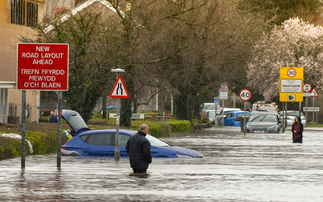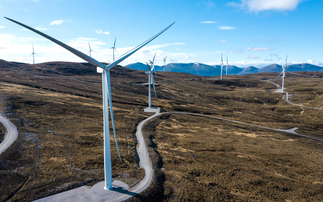Paris Agreement should give UK more confidence to back renewable energy and make deep emissions cuts, say onlookers
The Paris Agreement signed by ministers today commits nearly 200 countries to keep global temperatures to "well below 2C" and strive for warming of just 1.5C.
But what exactly could this mean for the UK's own climate change efforts and green business policies?
As many commentators, including some within the UK government, are quick to point out, the new Paris Agreement effectively mirrors the UK's own 2008 Climate Change Act, setting a long term target, with five year review periods that ensure keep policies steadily on track.
The UK Climate Change Act already commits Britain to reducing its greenhouse gas emissions by 80 per cent by 2050 compared to 1990 levels, but the government's own forecasts reveal the country is on track to miss its fourth carbon budget period for the mid-2020s.
Michael Jacobs, an advisor to the New Climate Economy and former advisor to Gordon Brown, reckons the new international deal could force the government to consider tougher targets. He predicted the government would now ask its climate change advisory body, the Committee on Climate Change (CCC) to examine the impacts.
He predicted the CCC would now be asked to look at the implications of a 1.5C scenario on the UK's carbon budgets.
"They may well say that right now it doesn't change anything because we've got carbon budgets quite well into the future," he told reporters. "But yes I think they will say our long-term targets need to be consistent with the new ambition.
"I think now every time we look at what's going to happen we look at consistency emissions gaps we're going to do two versions of them."
Meanwhile, a range of onlookers said the Paris deal will pile more pressure on the government over its recent spate of green energy policy rollbacks.
Lisa Nandy, Labour's Shadow Energy and Climate Change Secretary, said the deal should give the UK more confidence to take tough action on emissions.
"Having rightly signed us up to this global deal the Prime Minister must now urgently set out his strategy for how the UK will meet its new commitments to curb carbon pollution," she said in an emailed statement. "Now he can have the confidence that every country is going to do its bit, the Chancellor should review his recent decisions to roll back support for energy efficiency and clean energy projects."
Richard Black, director of the Energy and Climate Intelligence Unit think tank, said the deal means critics of climate action within the Conservative Party will struggle to be able to claim the UK is ""going it alone" on reducing emissions. "So the question for the Chancellor is: having stripped away virtually every low-carbon policy, what is the plan?" he told BusinessGreen. "Not only the plan to decarbonise, but to keep the lights on, reduce reliance on fuel imports, and repair the damage done to those innovative British businesses that have been, in recent years, building a thriving sector of the economy?
"After the Paris agreement, every other major economy will have a plan - well, many of them do already - so if Britain doesn't get one together quickly, we'll be going backwards through the field faster than a three-legged nag in the 2.30 at Epsom."
Greenpeace UK executive director John Sauven said the deal would put pressure on Cameron to provide more support for renewable energy over new gas plants.
"Will it be the fossil fuel industry that now has to be phased out or people across the globe who will ultimately pick up the tab if there is lack of action following the successful climate talks?," he asked in a statement. "The recent floods in Cumbria have shown the answer has consequences for Britain. Now it's David Cameron's turn to decide whose side is he on - the old polluters who caused the problem or the new renewable technologies that have just been given a shot in the arm."
The CBI is keen to see support for both gas and renewables, but it too used the passage of the Paris Agreement to call on the government to strengthen energy and climate policy. CBI director-general Carolyn Fairbairn said that "while the UK is making its voice heard at global talks, more needs to be done at home".
"The Government must provide a stable environment that enables investment in cleaner, more affordable and more secure energy generation, including renewable technologies and new gas plants," she said.
Speaking to reporters following three days of marathon talks, Rudd defended the government's record and confirmed the CCC would look at the implications of the 1.5C goal in the wake of the Paris Agreement.
She said that following the announcement of plans to phase out unabated coal the government was now providing a stable policy environment and had set out a clear plan for increased investment in gas and renewables, including the UK's world-leading offshore wind industry.
She also reiterated the government's commitment to the Climate Change Act and said that in the wake of the Paris Agreement she would engage with the Committee on Climate Change to identify the most cost effective way to meet the fourth and fifth carbon budgets.
Earlier this week, Energy Minister Lord Bourne similarly defended the government's planned cuts to solar subsidies, which are expected to be confirmed next week. "Subsidies are needed to get things moving initially but you don't want to be paying them forever and a day," he said. "What you do is need a level playing fields and that's the position that we want to be in to. And I think that gives us the moral authority to talk about cutting emissions."
The pressure on the government to turn that "moral authority" into bolder decarbonisation efforts and clean tech investments seems likely to crank up a gear, in the wake of an international agreement that everyone from David Cameron to Greenpeace agrees is historic.
This article is part of BusinessGreen's Road to Paris hub, hosted in association with PwC.








